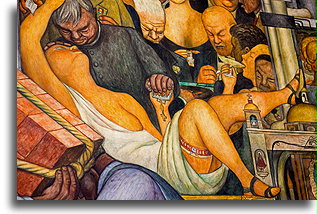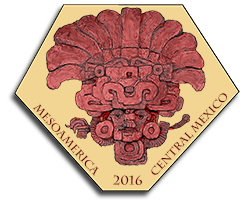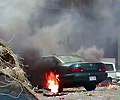The Capital Cty of Mexico
November 29 - 30
What is now the downtown of Mexico City correlates with the ancient island in Lake Texcoco and founded in this place in 1325 the Aztecs capital of Tenochtitlan. Yes, modern Mexico City stands on the lakebed of drained wetlands and on the ruins of a completely demolished pre-Columbian city. It is interesting to notice that while walking the streets in historic district you can see many leaning churches and residential buildings. This is due to instability of sandy ground soils and groundwater.




All the hotels in the historic part of Mexico City share one common feature, specific unpleasant odor. Because of the humidity, over the years, moisture builds up in the walls of buildings. The smell is not removable. Out of several places we have seen, we chose the most decent in our opinion, the Downtown Hotel.


It took Diego Rivera over 6 years to complete the staircase murals in the Palacio Nacional. Painter depicted historical scenes and actual events to tell the history of Mexico. Piled-up figures help to tell the stories of the Spanish Conquest, oppression of Indians, Inquisition, the Independence, and finally the Mexican Revolution.




After the destruction of Tenochtitlan, the location of major parts of the Aztec city was forgotten. So was in the case of the Templo Mayor or Great Temple, until the second half of the 20th century. At that time, several buildings were demolished, and archeologists uncovered not only the remains the temple, but also the House of Eagles Warriors, a place where elites held their ceremonies.





Metropolitan Cathedral was erected on the ruins of Aztec sacred precinct. After the Spaniards conquered the Aztec city, conquistadors decided to use the rubble from a destroyed temple dedicated to god of war, Huitzilopochtli. Today, this is the largest cathedral in the Americas, but standing inside it is difficult to feel and appreciate its size. This is because of the view is blocked by the huge golden altar which stands right at the entrance.













